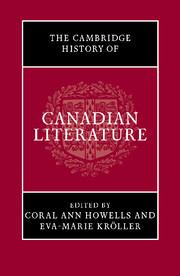Book contents
- Frontmatter
- Introduction
- PART ONE OLD AND NEW WORLD, LA NOUVELLE-FRANCE, THE CANADAS, DOMINION OF CANADA
- PART TWO THE POST-CONFEDERATION PERIOD
- PART THREE MODELS OF MODERNITY, POST-FIRST WORLD WAR
- PART FOUR AESTHETIC EXPERIMENTS, 1960 AND AFTER
- 18 Quartet: Atwood, Gallant, Munro, Shields
- 19 The short story
- 20 Canadian drama: performing communities
- 21 Poetry
- 22 Poetry, drama, and the postmodern novel
- 23 Comic art and bande dessinée: from the funnies to graphic novels
- 24 “Ghost stories”: fictions of history and myth
- 25 Indigenous writing: poetry and prose
- 26 Contemporary Aboriginal theater
- 27 Transcultural life-writing
- 28 Multiculturalism and globalization
- PART FIVE WRITING IN FRENCH
- Bibliography
- Index
- References
24 - “Ghost stories”: fictions of history and myth
from PART FOUR - AESTHETIC EXPERIMENTS, 1960 AND AFTER
Published online by Cambridge University Press: 28 September 2010
- Frontmatter
- Introduction
- PART ONE OLD AND NEW WORLD, LA NOUVELLE-FRANCE, THE CANADAS, DOMINION OF CANADA
- PART TWO THE POST-CONFEDERATION PERIOD
- PART THREE MODELS OF MODERNITY, POST-FIRST WORLD WAR
- PART FOUR AESTHETIC EXPERIMENTS, 1960 AND AFTER
- 18 Quartet: Atwood, Gallant, Munro, Shields
- 19 The short story
- 20 Canadian drama: performing communities
- 21 Poetry
- 22 Poetry, drama, and the postmodern novel
- 23 Comic art and bande dessinée: from the funnies to graphic novels
- 24 “Ghost stories”: fictions of history and myth
- 25 Indigenous writing: poetry and prose
- 26 Contemporary Aboriginal theater
- 27 Transcultural life-writing
- 28 Multiculturalism and globalization
- PART FIVE WRITING IN FRENCH
- Bibliography
- Index
- References
Summary
The organizers of the 1967 Centennial of Canadian Confederation promoted greater cohesion across social, political, and ethnic tensions in an intrinsically pluralist country. Even after the Centennial Commission had ceased to provide generous funds, many Canadian artists were committed to this project, but it became increasingly difficult to avoid the question whether such cohesion did not come at great cost to too many of the country’s constituents. This was a period when Canada’s collective memory was questioned, cultural icons were dismantled and unified visions of history and the mythology contested. More than ever before, Canadian artists began to view the beginnings of their country critically rather than nostalgically. The “ghost history” that haunts Canadian literature in the post-1960s is the symbolic representation of those elements of the country’s society that were previously barred from consciousness, and it is appropriate that revivals of the ghost story have been a preoccupation in contemporary Canadian criticism.
The revenants include Aboriginal people and immigrants who did not it the two “founding nations,” as well as parts of the country – such as Newfoundland, the last province to join Confederation – whose unfulfilled aspirations illustrate the strains within the Canadian body politic. While as late as 1960 the historian W. L. Morton stipulated that “[t]here is but one narrative line in Canadian history,” literary revisions of history and myth have increasingly served not only to bridge the many divisions, but also to make them even more obvious.
- Type
- Chapter
- Information
- The Cambridge History of Canadian Literature , pp. 478 - 498Publisher: Cambridge University PressPrint publication year: 2009



